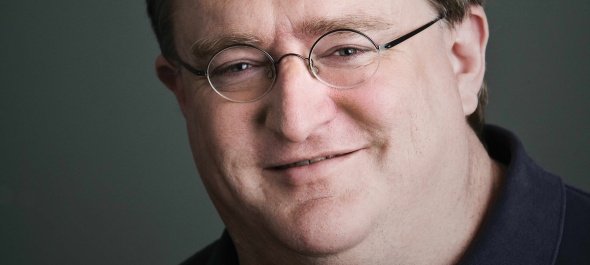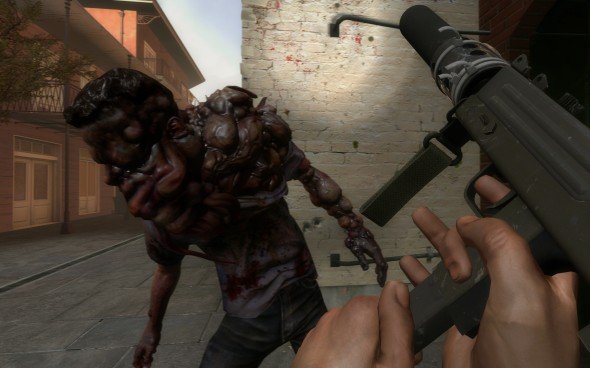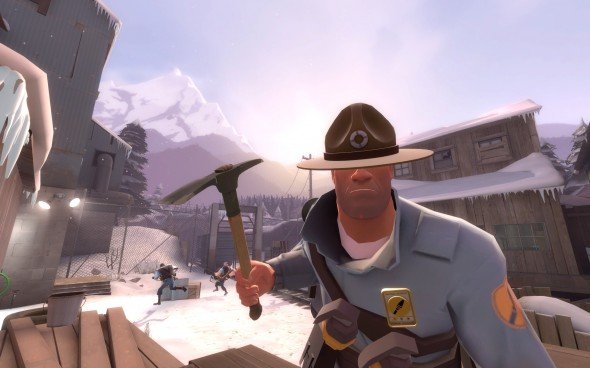Interview: Gabe on Valve's big surprises

Valve are surprising. Half-Life itself was surprising enough, but then they surprisingly scooped up Counter-Strike, sprung Steam on us surprisingly, turned Half-Life 2 surprisingly episodic, then took surprisingly long on the episodes. When I flew out to visit them last month, I half expected to find they'd moved to the moon and turned themselves into a yacht manufacturer. And since they hadn't, I was, again, surprised.
I was there to play Portal 2 co-op for the preview feature you can read in the current issue of PC Gamer in the UK , and interview seven of their key staff for a profile on Valve themselves to go with it. But they told me so much cool stuff that we're going to be putting up an interview a day for the next week. Today's is from a marathon chat with MD Gabe Newell, project manager Erik Johnson, and marketing director Doug Lombardi, and I start by asking them the question I've wanted to ask them for about three years.

PC Gamer: From a player's perspective, the two things that mark you out as a company is that a) all the games you do are very very good, and b) almost every major decision you make is really surprising. It's hard to figure out what the overall strategy is.
There's The Orange Box where you're bundling everything together in one nice package – that took us all by surprise. So then with Left 4 Dead we were thinking “Ooh, what are you going to bundle with that?” and you didn't bundle anything with that, so we were surprised again.
Then Team Fortress 2 starts to evolve into this whole new thing where it's doubling the content you get, for free, which even the most optimistic of us didn't expect. So everyone's waiting for that with Left 4 Dead, and suddenly a sequel is announced, very soon after, and that seems more like a traditional publishing model.
Is there a common thread?
Gabe Newell: Oh yeah, absolutely. I mean think about it from our perspective, where we're very much at the infancy on design decisions, how to give customers value. We have way, way more questions than we have answers, and so a lot of what we do is designed to give us a good perspective on our range of choices. It's not to assume that we already know, but to do things that are different enough that we can then compare them and see what the results are.
The biggest gaming news, reviews and hardware deals
Keep up to date with the most important stories and the best deals, as picked by the PC Gamer team.
If you keep doing the same thing over and over again, it's much harder to work out where you should go. TF2 has been a great... I mean we've learned an incredible amount, and everything we've done on TF2 is going to have an impact on all of our games. Counter-Strike – we still are internalizing lessons from the original Half-Life 1 based Counter-Strike. We always think of our products as being part of an ongoing evolution and that each of those choices should give us useful data to make our future products better. Everything is a step towards the next product, and the next product.
Orange Box was a really interesting experiment around... I can guarantee you that people are going to be surprised at stuff we do. (Laughs) That isn't going to stop anytime soon. I'm just laughing because people will be shocked again.
PC Gamer: By something you're going to do soon?
Gabe Newell: Yes.
But to us I think it makes sense, because every single one of those things has resulted in us learning a lot. If you look at an optimum strategy, I think you have to fail. If you don't have a large enough dynamic range to fail, then you're not going to be able to figure out where you go next. And the idea that we're anywhere close to the potential of games as a medium is... we're so far from [that]. We as an industry, we've barely even taken our first steps.
At the same time we're trying to build products, and have our customers think they're getting great value, we also feel like we have to keep trying different things to inform our decisions of what to do next, right?
Things that we're not doing enough experimentation on are mobile - I think all of the answers today in the mobile space are totally retarded. In spite of that, we don't really get to have much of an opinion because we haven't done anything. The GameBoy has been out forever; has Valve ever done a mobile game? No. So we only get to bitch so much about what other people do.
I think there's some really interesting stuff coming in the free-to-play and the microtransaction stuff, and we haven't really done anything interesting there to explore into understand it. (To Doug & Erik) What else are we not doing enough experimentation on?
Doug Lombardi: Casual games.
Gabe Newell: Casual games, right.
Erik Johnson: Motion.
Doug Lombardi: Yeah, motion's another one.
Gabe Newell: So when we're figuring out what we're doing next, we'll put up a list and do different things.
One of the most important things for us is what people want to do, right? Left 4 Dead 2 was an example where a group of people voted really hard “we want to do this” internally. So what people want to do... the sort of technologies that we think need to be moved forward in a low risk sort of way. It's not experimentation, it's “we need to do this, and we need to do this” - and that's a set of things.
We think a little bit of diversity, like wanting to have a wider range of game types than we do, that's a plus. Experiments like “this is a safe product for us to try this” where the experiment can fail totally and the product will still be valuable to customers - we love those kinds of things.
Erik Johnson: We have to carry some risks, that's important.
Gabe Newell: Yeah... TF2, for example, is a great field for us to explore different kinds of things. It absorbs a lot of, you know... hats.
PC Gamer: (Laughs) It absorbs hats?
Gabe Newell: If we said “Oh we're announcing Half-Life 3: our war-themed hat simulator game!” people would go “What the hell are you talking about?” With TF2, we can do a bunch of things and learn about a bunch of stuff in a way where that audience is happy to go along for the ride. We can't destroy TF2 by adding funny hats to it. Does that make sense? It's a safe place to try this out and see what people like, what people don't like. Make some changes to make sure people really understand what they like and don't like.
PC Gamer: So it adds a large margin of error, in terms of thematic stuff? Like, hats aren't going to make it feel too cartoonish, because it's already a cartoon.
Gabe Newell: Right. That's one of the advantages of stylized games. They tend to be able to absorb a lot of variation, whereas if you have a photorealistic game, the range of interesting choices is a lot harder. Counter-Strike would just be, from a visual design perspective, a lot harder to do this feature. And it might end up compromising the whole thing, just because you end up doing a bunch of military style helmets that are indistinguishable at a distance. When it's the fact that somebody across the map can tell that you're cooler than they are...
Erik Johnson: You definitely wouldn't want to do it there first.
Gabe Newell: That's what I'm saying, right? Each project sort of has natural and unnatural opportunities to try different things. So each time we look at it, "What are the things we evaluate? What are the things we want to learn from this? What are the things we want to try out? And what are the safe things that we can try out that won't screw our customers?"

PC Gamer: I'm sure everything you do, you have a section of fans who bitch about it- (Doug laughs) That's a fair comment, isn't it?
Doug Lombardi: It wasn't the comment! (Laughs) I was just giggling.
Erik Johnson: I mean, there weren't a lot of fans that complained about Alien Swarm...
Gabe Newell: Oh yes there were!
Erik Johnson: Who? What's the angle?
Gabe Newell: “Where's the Mac version?”
Doug Lombardi: Yeah, "Where's the Mac version?” “How come you're not doing more content?”
(All laugh)
Gabe Newell: That's a fair complaint!
PC Gamer: Obviously you have to tune out sometimes, but there seemed to be a strong reaction to Left 4 Dead 2. Obviously it sold really well, so what did you take away from that? Did you think “Oh, it sold anyway, we can ignore all those guys," or did you think "We need to..."
Gabe Newell: No, we actually did a bad job of talking about our products to that community beforehand, right? That was just us not thinking ahead, and if we had talked to them about it better...
So the thing that makes me happy is when you look at the customers who self-identified as boycott members, they actually bought Left 4 Dead 2 at a higher rate than any other group of Left 4 Dead 1 owners. Which to me means we delivered a good product, because they had every reason not to buy the product. But we also spent a lot of time talking to those people, and explaining to them why this was like all our other products: it was worth their money and worth their time.
We set ourselves up by not thinking ahead to the fact that this would occur, and that's why we spent a fair amount of time addressing those concerns, because we thought they were legitimate issues for people in the community to raise. That's why he (indicates Erik) and I got on a plane and flew down to Australia.
Erik Johnson: Flew halfway round the world. It's pretty rare that there's not...
Gabe Newell: There's always some information.
Erik Johnson: There's always some information, in all complaints.
Gabe Newell: It's a signal to noise problem. If you decide to tune out signal just because there's a lot of noise, then you're missing a tremendous amount of opportunity to do well by your customers.
Erik Johnson: I think that some people in that group were saying they were fans of Valve, and they were saying: "Has Valve changed in some way that was unannounced?" And we were like, “No, but we didn't explain anything very well.”
PC Gamer: But did you come away from that thinking a one year sequel can be a good thing?
Gabe Newell: Oh sure, there are certainly circumstances in which that's a completely valid thing to do. I think that it never hurts to communicate better, and... the more information you give to customers, the happier they're going to be.
Doug Lombardi: And it was a unique situation in Left 4 Dead's case too, to be able to do a sequel that fast. I don't know that the majority of our other titles we could even pull that off if we said we wanted to, right?
Gabe Newell: I'm sure at some point we're going to do it again, the point is we learned something about that, which is... your point earlier was that we surprise our customers, and there's a certain amount of entertainment value in that.
But then there's also a certain amount of fear value in that, because the traditional surprise in the gaming industry is not “Oh, I'm surprised: something good happened!” The traditional surprise is “Oh, I'm surprised: X-Fire just got bought again and went away.” “Oh, I'm surprised because something horrible has happened to a franchise that I've been following since I was a little kid.”
PC Gamer: “Oh, I'm surprised: Assassin's Creed II needs to be online all the time.”
Gabe Newell: Yeah. The average surprise is negative, not positive, and so if we're going to surprise people we need to be conscious of that fact. Because we're going to continue to surprise. We have three pretty big surprises in the next twelve months, at least.
PC Gamer: Are these related to specific games?
Gabe Newell: We have three surprises. I'm talking about surprises, not the surprises themselves. But we're going to do three things that have the potential to... that will be novel. And if we don't make sure that people understand what we're doing, they could easily respond in a Left 4 Dead 2 kind of way. Like, “What the hell?” right? And we just need to be good about that.
We also have to be conscious of the fact that there are a lot of different people that we talk to. Like, there's people who are really close to us and trust us, and there are other people who play our games and that are more sceptical. And you need to make sure you're talking to both of those groups in clear enough fashion, to make sure that just because one group is happy and on board, it doesn't mean the other groups are going to be.
PC Gamer: A good way to make sure you communicate well about your future surprises would be to tell me about them, so we can write about them in the mag.
(All laugh)
Doug Lombardi: Noted!
Gabe Newell: I'm sure we will when we're ready to.

Tomorrow, I ask Gabe and co if there's anything they think they've failed at, and get a marathon answer. As Erik puts it:
Erik Johnson: Here's “Valve tells us why they suck!” (Laughs)
Doug Lombardi: It's not like any random group of Valve fans couldn't generate a list of our public failures, right? It's not like it's a secret.
Gabe Newell: For our private failures you just have to go to Robin's Flickr page.

